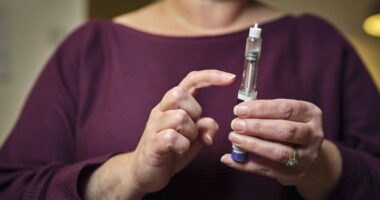Share this @internewscast.com
My teenage daughter, who’s 15, is experiencing rapid and excess body hair growth. She also struggles with acne, and her menstrual cycles are quite irregular. What might be causing these issues?
These symptoms—irregular menstruation, acne, and increased body hair—are classic indicators of a condition known as polycystic ovarian syndrome (PCOS).
The disorder causes cysts to grow on the ovaries and disrupts female hormones that govern the natural menstrual cycle, triggering these symptoms.
Fortunately, there are treatment options available. The initial action for someone suspecting they have PCOS is to seek a diagnosis. A GP can conduct hormone blood tests that reveal any abnormal levels. They can also refer patients for an ovarian ultrasound to check for cysts.
Given that many women may have ovarian cysts without exhibiting PCOS symptoms, blood tests remain crucial. Those with symptoms and altered hormone levels would then proceed with PCOS treatment.
Certain medications address PCOS itself, such as the contraceptive pill, which can help regularize periods and reduce unwanted hair growth. Another option is the diabetes medication metformin, known to aid in normalizing menstrual cycles.

A combination of irregular periods, acne and excessive body hair are telltale symptoms of a condition called polycystic ovarian syndrome, or PCOS
Metformin – which lowers blood sugar levels – can also combat PCOS’s increased risk of obesity through reducing the body’s tendency to store fat.
Doctors might also use treatments targeting specific symptoms of PCOS, like isotretinoin pills (commonly known as Roaccutane) for severe acne, along with hair removal creams.
Many PCOS patients also opt for laser hair removal at a young age, though this is not available on the NHS.
I have skin cancer – specifically basal cell carcinoma – on my chin. A dermatalogist recently assessed it and said I’ll have to wait a year to have it surgically removed, though. It’s been slowly growing, occasionally bleeds and is crusty. Is it safe to wait so long?
There is usually no rush to treat basal cell carcinoma because it’s typically not life-threatening. However, a year does seem quite a long time to wait.
Basal cell carcinoma (BCC) is the most common skin cancer and often appears on the head, neck and ears. It usually appears as a scab or a red spot that doesn’t heal and they tend to get crusty and bleed, too.
The good news is that it does not spread like other cancers – and is rarely lethal. This is why patients diagnosed with BCC do not receive the same urgent treatment as most cancer patients.
The procedure to remove a BCC tumour often takes no longer than 30 minutes and can be done under local anaesthetic.
If a dermatologist has recently assessed a BCC and has confirmed that there is no immediate need for surgery, then that’s reassuring.
Having said that, a year is a particularly long time to wait for surgery. Most BCC patients have the procedure done within six to nine months of diagnosis.
If a patient is ever told their wait for a procedure – or appointment – is surprisingly long, it might be worth flagging to the hospital, as clerical errors do happen.
However, in almost all cases, it is safe for BCC patients to wait a year for surgery – though, admittedly, it must be a horrid feeling to go that long with untreated cancer.
I’m 76 and, until recently, played tennis twice a week and thought of myself as perfectly healthy. But four weeks ago I woke up and could hardly walk. An X-ray showed severe arthritis in my left hip. I’ve now been put forward for a hip replacement. How can this have happened so quickly?
In older patients, the most common form of arthritis is osteoarthritis, caused by wear-and-tear to the joints. However, it is important to note an X-ray alone is not detailed enough to diagnose osteoarthritis.
Large joints, such as the hip, are complicated structures with ligaments, soft tissue, muscles and fluid that don’t appear on X-rays. Many people show signs of arthritis on a scan, but have no symptoms. So it’s possible hip pain could also be triggered by an injury to these areas of the joint – particularly if the pain comes on suddenly.
That’s why a detailed MRI scan is always necessary to make an arthritis diagnosis.
However, GPs these days are under pressure to send patients for fewer MRIs because of their high cost – averaging some £400.
Patients will often need to get a referral to a physiotherapist or arthritis specialist before they can get an MRI.
If a scan does reveal signs of osteoarthritis in the joint, then a joint replacement may be what’s required. The waiting times for this procedure can often be longer than a year.
In the meantime, patients are usually prescribed painkillers and are encouraged to see a physiotherapist. Staying active is key, too, in order to keep the joint flexible.
It seems like everyone is taking creatine these days. Until recently, the supplement – which is typically sold as a white powder dissolved in water – was only taken by gym-bros and high-performance athletes for its supposed ability to boost and prolong muscle strength.
Will creatine really protect you from falls?

While generally safe, creatine can cause liver damage, diarrhoea and vomiting in large consumption
But people of all ages are now being encouraged to take it. Last week, ITV’s Dr Hilary Jones said that it was a great supplement for older patients to keep their muscles strong, bolstering their protection against dangerous falls. A number of my older patients say they take it for this reason, too, but I’m not convinced about such a claim.
And while generally safe, creatine can cause liver damage, diarrhoea and vomiting in large consumption.
Have you tried creatine? Did you experience any side effects? Please tell me via the email below.
I fear for these snubbed women
I’m worried women suffering from a serious mental health condition are not receiving the attention they deserve.
Pre-menstrual dysphoric disorder (PMDD) causes mood swings, depression and insomnia in the week or two before a period begins.
In the past, it’s been brushed off as another version of pre-menstrual syndrome (PMS) – the common symptoms that most women experience in the lead up to their period. But it’s far more severe than this.
And, having looked after PMDD patients, I’m concerned treatment options are limited to hormone management via the contraceptive pill or anti-depressants.
It’s no surprise some patients with PMDD say the menopause – which many women dread – came as a relief as their symptoms went away.
Have you suffered with PMDD? Please contact me using the email on the right.
















